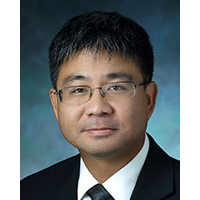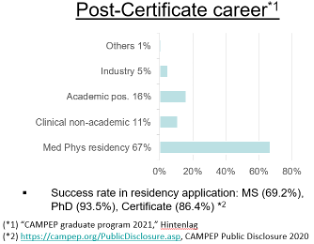Deadline to apply: The Johns Hopkins CAMPEP-accredited Medical Physics Certificate Program operates on a rolling admissions basis. Applications are accepted throughout the year, with no specific deadline. Prospective students are encouraged to apply at their earliest convenience.
What is Medical Physics, Medical Physicist?
Medical physicists are professionals with an MS or PhD degree, specializing in the technical and clinical aspects of diagnosis and therapy. They work alongside MDs and technologists, contributing to technical areas such as imaging, radiation therapy, and radiation safety. The field is governed by organizations like the American Association of Physicists in Medicine (AAPM), the American Board of Radiology (ABR), and CAMPEP (Commission on Accreditation of Medical Physics Educational Programs). The Medical Physics field benefits significantly from NIH funding in radiation and radiological sciences, placing JHU in a competitive position among institutions.
Certificate Program in Medical Physics at Johns Hopkins
 The Medical Physics Certificate program at Johns Hopkins University offers a post-bachelor certificate designed for students in a non-medical physics field pursuing careers in medical physics. This program features a dual-track system: one for students with a CAMPEP-approved background in physics or physical sciences and one for non-CAMPEP students who will not pursue CAMPEP residency. The curriculum requires the completion of 18 credits with students trained to excel as researchers, certified clinical professionals, or industry experts. The program is a joint effort between the Radiology and Radiation Oncology departments, fostering comprehensive educational experience. For application, apply now (Application Management).
The Medical Physics Certificate program at Johns Hopkins University offers a post-bachelor certificate designed for students in a non-medical physics field pursuing careers in medical physics. This program features a dual-track system: one for students with a CAMPEP-approved background in physics or physical sciences and one for non-CAMPEP students who will not pursue CAMPEP residency. The curriculum requires the completion of 18 credits with students trained to excel as researchers, certified clinical professionals, or industry experts. The program is a joint effort between the Radiology and Radiation Oncology departments, fostering comprehensive educational experience. For application, apply now (Application Management).
Leadership
 | Kai Ding Co-Director of PhD Program Co-Director of Certificate Program Director of Medical Physics Residency Associate Professor [email protected] Lab |
 | Ken Taguchi Co-Director of PhD Program Co-Director of Certificate Program Professor [email protected] Lab |
 | Yong Du Associate Professor [email protected] |
 | Heng Li Associate Professor Director of Proton Physics Vice Chief of Physics/Clinical-NCR [email protected] |
 | Xun Jia Professor Chief of Medical Physics Division [email protected] |
 | George Sgouros Co-Director of the Medical Physics Program Professor Director of Radiological Physics Division [email protected] Lab |
Medical Physics Career

The medical physics career path typically starts with completing a CAMPEP-accredited graduate program (MS or PhD) or certificate program (post-PhD). After this education, candidates are eligible to take the American Board of Radiology (ABR) Part I exam. Successful candidates then move on to residency training, which usually lasts for 2-3 years. Following residency, individuals work as clinical medical physicists and must pass the ABR Part II and Part III exams, taking about 1-2 years. Once these exams are completed, they achieve ABR certification as a medical physicist. Certified medical physicists must continue with Maintenance of Certification (MOC) and lifelong learning to stay current in their field. Since 2012, the ABR Part I exam has required CAMPEP-accredited education, and since 2014, the ABR Part II exam requires CAMPEP residency training.
Why Medical Physics Certificate
 We offer a rigorous and comprehensive medical physics program designed to impart a strong foundation in both theoretical knowledge and clinical application. By emphasizing solid technical expertise alongside hands-on clinical experience, our graduates are equipped to become the next generation of leaders in the field. As the first complete Medical Physics training program in Maryland offering MS, PhD, certificate, and residency, we provide a uniquely integrated education that prepares students for the full spectrum of professional opportunities.
We offer a rigorous and comprehensive medical physics program designed to impart a strong foundation in both theoretical knowledge and clinical application. By emphasizing solid technical expertise alongside hands-on clinical experience, our graduates are equipped to become the next generation of leaders in the field. As the first complete Medical Physics training program in Maryland offering MS, PhD, certificate, and residency, we provide a uniquely integrated education that prepares students for the full spectrum of professional opportunities.
 The future career opportunities for Medical Physics PhD graduates primarily involve residency programs in therapy and imaging. In 2021, there were 110 therapy residency programs available, with 95 located in the USA, 14 in Canada, and 1 international program. Additionally, there were 37 imaging residency programs, comprising 35 in the USA and 2 in Canada. Of these, 25 focused exclusively on imaging, while 12 offered a combination of imaging with nuclear medicine, either as a required or optional component. The chart also shows a steady increase in the number of residency programs from 2016 to 2021, indicating growing opportunities for aspiring medical physicists.
The future career opportunities for Medical Physics PhD graduates primarily involve residency programs in therapy and imaging. In 2021, there were 110 therapy residency programs available, with 95 located in the USA, 14 in Canada, and 1 international program. Additionally, there were 37 imaging residency programs, comprising 35 in the USA and 2 in Canada. Of these, 25 focused exclusively on imaging, while 12 offered a combination of imaging with nuclear medicine, either as a required or optional component. The chart also shows a steady increase in the number of residency programs from 2016 to 2021, indicating growing opportunities for aspiring medical physicists.
Curriculum
The Medical Physics Certificate program at Johns Hopkins includes a CAMPEP core graduate curriculum, totaling 18 credits, which provides foundational knowledge in the field. The core courses include:
- Radiological Physics and Dosimetry
- Radiation Protection and Safety
- Medical Imaging Systems
- Radiation Biology
- Human Anatomy and Physiology
- Radiation Therapy Physics
Eligibility
Our program offers two tracks, CAMPEP track and non-CAMPEP track. The students on the non-CAMPEP track may fulfill the CAMPEP requirements as defined below and transfer to CAMPEP track.
https://campep.org/CertificatePrograms.asp
Students enrolled in these certificate programs must have a PhD in physics or a related discipline and shall comply with existing CAMPEP-approved undergraduate physics coursework requirements as specified in the Standards for Accreditation of Graduate Educational Programs in Medical Physics.

